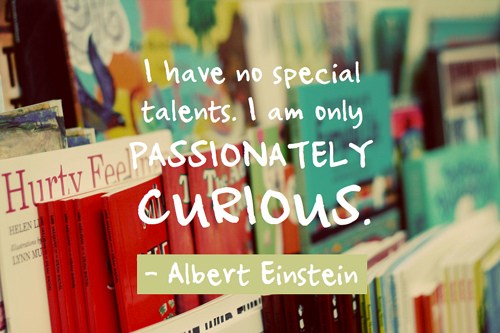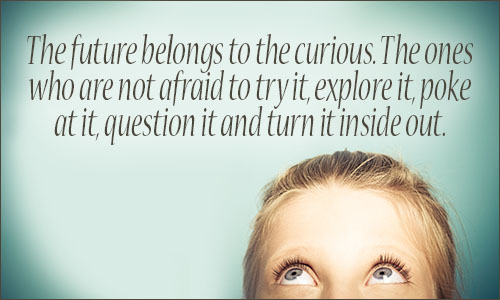What Does It Take to be a Great Athletic Competitor?
Aren’t You Curious?
Strength? Yes. Speed? Sure. Hand-eye coordination? That’s important. Mental skills like persistence and resilience? Certainly. The ultimate competitor will have these, but all are probably less important than...
curiosity. Curiosity is a skill – something that can be learned and something that affects performance – and it is one of the most important skills for competitive athletes to have…or get. (Carol Dweck’s research is clear on the point that personality traits like competitiveness and curiosity are fluid, not static.)
Curiosity is a strong desire to know or learn something, so it makes sense that people who have that desire will find more answers about how to win than others. When an athlete is curious, he spends his time wondering stuff. He asks questions. When people ask questions, they find answers and when they don’t, they don’t. It really is that simple.
Truly competitive athletes spend a lot of time being curious. They ask how. They ask why. They find more questions to ask: Why does he hit the ball so far when he swings so easy? Why did that curve ball I just threw curve more than most of my others? What happens when I step a little more to the left? What is the best way to block my base while receiving a throw? Why wouldn’t we fake a bunt and steal third base every time? How do I get my body to stop rushing? How do I get my mind to stop worrying? And on and on, not just on the field or court, but at lunch and in hallways and bedrooms.

Many teen-aged athletes are led to believe that they are a coach’s dream if they show up on time with positive energy, they hustle, and they do what they are told. To really be a coach’s dream, however, they must be a leader. This means they must develop their ability to both self-adjust and help others. This comes, perhaps more than any other single skill, from their curiosity. Are they actively pursuing both questions and answers?
It is logical that a strong desire to know or learn something is a core characteristic of world-class athletes. Unfortunately, coaches often unintentionally stifle curiosity. Instead of encouraging struggle, they provide answers about mechanics and strategies. Instead of teaching the how and why details, they allow the athlete to do it a particular way simply because they were told to do it that way. Why is a failure to develop curiosity such a common coaching mistake? There are many reasons, including haste and ease. It is simpler to provide answers than to draw answers out of others. This coaching style typically aids performance in the moment, although we can see that it commonly has the opposite long-term effect. What other reasons? Ego. It feels good to seem smart. Familiarity. This is how the coach was coached. Less resistance. Athletes succumb to human nature by wanting the answers provided, rather than embracing the struggle to find them. Perhaps it would be wise to reframe the art of coaching as a guide along the journey of mastery rather than a well-researched answer key.
What are we going to do about all this? If you agree with my points above, share your perspective (with your players, and we'd also love your comments below). Awareness is the foundational step for adjustments. Next, slow down. Take time to ask more questions. Reward athlete when they ask questions and do research. Assign homework and reward creativity. Another great idea is to meditate. Allow the mind to be still by scheduling time to take a break from the busy-ness of business and start that time with focused breathing. Allow the wisdom that is already inside to bloom. If you prefer, you don’t have to call it meditation. Instead, you might call it curiosity practice. Perhaps when you meditate, you will come up with a thousand more ways to develop curiosity in your athletes, and your athletes will come up with a thousand more ways to win a contest.


